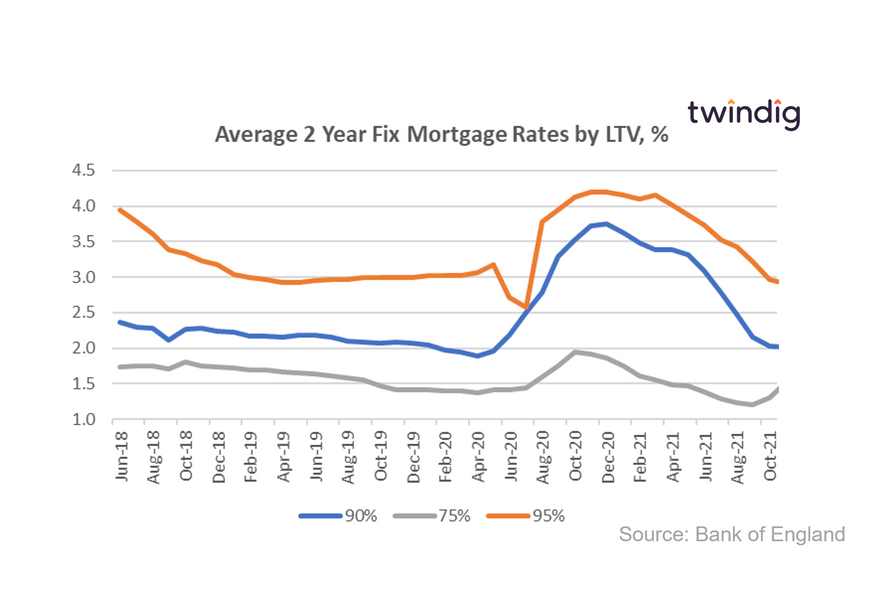Are mortgage rates on the turn?

The Bank of England released data today about mortgage rates by Loan To Values (LTVs)
What they said
Average mortgage rate for 75% LTV mortgages 1.52%
Average mortgage rate for 90% LTV mortgages 2.02%
Average mortgage rate for 95% LTV mortgages 2.91%
Twindig take
The average mortgage rate for a two year fixed rate 75% LTV mortgage has risen for the second month in a row, whilst mortgage rates for higher LTV products continue to fall, the rate of decline has reduced significantly. Many commentators believe that an increase in Bank Rate is now inevitable and perhaps the latest rate movements indicate that mortgage rates are on the turn. However, with the added economic uncertainty caused by Omicron, the timing of a rise in Bank Rate may not be as inevitable as some believe.
95% LTV Mortgages
The average mortgage rate on 95% LTV mortgages is 2.91% a fall of 2.0% from the previous month when the rate was 2.97%. On average the rate you can fix today is 31% lower than it was one year ago. This will be welcome news given the high levels of speculation this week that mortgage rates will be starting to rise.
90% LTV Mortgages
The average rate on 95% LTV mortgages is 2.02%, which is 0.5% lower than the previous month when the rate was 2.03% and 46% lower than the same time last year when the average rate was 3.72%. This again will be welcome news especially for those who are moving down the LTV scale as they re-mortgage from say a 95% LTV mortgage to a 90% LTV mortgage
75% LTV mortgages
The average mortgage rate on 75% LTV mortgages is currently 1.52% an increase of 16.9% compared to the average rate last month of 1.30%. This is the second month in a row that the mortgage rate for 75% LTV 2 year fixed rate mortgages has risen, the rate has increased by 27% over the last two months.
We appreciate that in the big scheme of things a mortgage rate of just 1.52% remains very low indeed, but the increase goes against the trend. Could this mark the turning point of mortgage rates? The explanation could be market-related, by which we mean that lenders have too much demand at these levels and are tweaking up mortgage rates to reduce the demand for these particular mortgage products. However, it might also be lenders preparing for a rise in the underlying Bank Rate.
Mortgage calculator
To check how much your existing mortgage payments are and to see what they could be if you re-mortgage, you can use our handy mortgage calculator
What does this mean for house prices?
Falling mortgage rates support further house price growth as a lower mortgage rate means the cost of a mortgage is cheaper and therefore you can afford to take on a bigger mortgage. Falling mortgage rates also imply that lenders are more optimistic about the future direction of house prices - because lower mortgage rates suggest that the risks attached to the mortgage are lower than they were and by offering lower mortgage rates lenders will expect to do more business.